American Revolution
I recommend these books to an adult or teen wishing have an understanding of the outlines of the American Revolution. They appear in a suggested order of reading, starting with some basic surveys and progressing to original works and more specialized topics. Some of these books are in print, but others will require finding copies at a library or through a used book source.
The difference between original works, those contemporary to the American Revolution, versus later analysis and conjecture is indicated by using solid bullets for original works and hollow bullets for modern works.
- The American Revolution in 2 minutes – The entire history of the American Revolution is summarized in this 2-minute video by Scott Powell.
- America's Revolutionary Mind, A Moral History of the American Revolution and the Declaration That Defined It by C. Bradley Thompson. The purpose of this book is twofold: first, to elucidate the logic, principles, and significance of the Declaration of Independence as the embodiment of the American mind; and, second, to shed light on what John Adams once called the "real American Revolution"; that is, the moral revolution that occurred in the minds of the people in the fifteen years before 1776.
- History of America by . These recorded lectures give an essentialized history of America from its colonial beginnings.
- The Birth of the Republic, 1763-1789 by . Survey of political history from the beginning of the Imperial Crisis to the ratification of the Constitution, ideal as an introduction to the Revolution for high school students and college freshmen. According to Morgan, the Patriots consistently upheld the principle that no man may be taxed without his consent. The Constitution was framed to preserve that liberty which the Patriots won in the Revolutionary War.
- Patriots, The Men Who Started the American Revolution by . Vivid retelling of the lives of Patriot statesmen and soldiers in their struggle to resist British oppression and secure liberty, from the Imperial Crisis through the Revolutionary War.
- The Autobiography of Benjamin Franklin by . Life story of a self-made man of the Enlightenment, who rose from poor obscurity in Philadelphia to world recognition as America's foremost scientist, inventor, and statesman.
- Sources and Documents illustrating the American Revolution by . Best short collection of the basic political documents from the Imperial Crisis, American Revolution, and framing of the Constitution.
- In Pursuit of Reason, The Life of Thomas Jefferson by . As good a biography of Jefferson as you can get (it is implicitly leftist; but he is pretty conscientious about the basic facts, and is fairly intelligently admiring of Jefferson); and it is the right size.
- The Life and Selected Writings of Thomas Jefferson by . Best short collection of Jefferson's works, from major achievements like the Declaration of Independence and Virginia Statute for Religious Freedom, to his insightful correspondence with John Adams, James Madison, and others. A window into the mind of America's most eloquent spokesman for individual rights.
- James Madison and the Creation of the American Republic by . Short account of the political life and thought of the Father of the Constitution and Bill of Rights.
- The Life and Major Writings of Thomas Paine by . A collection of major political works by the Deist and individualist Thomas Paine, a humble English immigrant whose eloquent and forceful articulation of the natural rights of man inspired the American people to declare independence and then keep fighting during the darkest days of the Revolutionary War
- The Federalist Papers by . Written by Alexander Hamilton, James Madison, and John Jay while the Constitution was being debated in New York, these essays constitute the American Revolution's single greatest contribution to political science, namely, the idea of a federal republic.
- The Godless Constitution, The Case Against Religious Correctness by . Argues that the Framers of the Constitution favored a complete separation of church and state even before Congress added the Bill of Rights. Their determination to avoid any reference to religion in the body of the text upset evangelical Christians for a century. Debunks the religious right's contention that the Framers meant the United States to be a "Christian nation."
- A Basic History of the United States by . The five volumes are in paperback, and all of them together are no larger than a standard 800-900 page textbook. Carson is a religious conservative, and this occasionally shows through. But he is fairly explicit about his religiosity, so for that reason I do not think it is so bad. (Better that, than the implicit or disguised leftist propaganda which passes for most American history.) He is more objective (less leftist) than any other textbook writer that I have read. However, volume 5 (*The Welfare State: 1929 to 1985*) is terrible. It is as if this volume were written by a different author, who is completely mealy-mouthed about the New Deal and the Welfare State. (out-of-print, see sources.)
Advanced and Supplementary Resources
- Essays Historical and Literary by . (2 vols. in 1, 1907). A prime example of 19th-century historical writing. Has good biographies of Jefferson, Madison, Hamilton, Jackson, etc., plus other interesting essays--good for their own sake and as an example of the 19th-century approach to history through sweeping generalizations, and through superb literary style.
- John Adams and the Spirit of Liberty by C. Bradley Thompson, University Press of Kansas, 1998. The best examination of John Adams's political thought, demonstrating that this much maligned Founder was the most profound political thinker of the American Enlightenment. Examines his writings during the Imperial Crisis as well as his four volume study of political science. Defends Adams as a champion of individual rights and republicanism against accusations that he favored aristocracy and monarchy.
- The Sacred Fire of Liberty, James Madison and the Founding of the Federal Republic by , Lawrence: University Press of Kansas, 1994. The best examination of James Madison's political thought, giving one of the greatest Founders his just desserts after years of neglect by scholars. Shows how Madison invented the concept of federal republicanism and drafted the Constitution and Bill of Rights to preserve individual rights, opposing absolute power in both the national government and the states.
- Middle-Class Democracy and the Revolution in Massachusetts, 1691-1780 by , New York: Harper and Row, 1969 [1955]. The classic work which debunked Progressive historians' socialistic claims that class conflict was the driving force behind the Revolution. Brown shows that Massachusetts had attained a middle-class society and a democratic government before the Revolution; the colonists fought not to create liberty and equality, but to preserve it against the British government.
- King and People in Provincial Massachusetts by , Chapel Hill: University of North Carolina Press, 1992 [1965]. Shows that Massachusetts's opposition to British authority extended back into the seventeenth century. Massachusetts Patriots were driven to oppose Britain from a much justified fear of being reduced to poverty and slavery by predatory, unaccountable bureaucrats. Holds provocative lessons for today's grim political scene.
- The Lamp of Experience, Whig History and the Intellectual Origins of the American Revolution by , Indianapolis, Ind.: Liberty Fund, 1998 [1965]. A study of the Founding Fathers' reading of ancient and modern histories and their application of historic knowledge in making the decision to resist Britain in defense of colonial rights.
- The Unvarnished Doctrine, Locke, Liberalism, and the American Revolution by , Durham, N. C.: Duke University Press, 1994 [1990]. Responding to those scholars who have tried to minimize Locke's importance for the Revolution, Dworetz demonstrates that the New England clergy, who played so great a role in agitating the people to oppose Britain, adopted Locke's pro-rights political philosophy along with his pro-reason theology and epistemology.
- Locke in America, The Moral Philosophy of the Founding Era by , Lawrence: University Press of Kansas, 1995. Seeks to place the pro-reason, pro-individualism, pro-capitalism philosophy of John Locke back at center stage in the American Revolutionary mind. Argues for Locke's enormous influence on eighteenth-century America's culture and politics.
- From Resistance to Revolution, Colonial Radicals and the Development of American Opposition to Britain, 1765-1776 by , New York: Vintage Books, 1974 [1972]. Demonstrates the prudent, rational steps which the Patriot leaders took to oppose British oppression without anarchic disorder. Places the Americans' struggle for liberty in a transatlantic context.
- The Stamp Act Crisis, Prologue to Revolution by , New York: Collier Books , 1962 [1953]. After half a century, still the best study of the origins of the Revolution in the Stamp Act Crisis of 1765. The Morgans contend that the Americans faced a real plot by the British to subject them to Parliament's arbitrary power. They demonstrate that, throughout the Imperial Crisis until the eve of independence, the Patriots consistently upheld the principle that no man may be taxed without his consent.
- The American Revolution and the Politics of Liberty by , Baton Rogue: Louisiana State University Press, 1998. The best short study of the political thought of the major Revolutionaries. Demonstrates that the Founding Fathers resisted British authority out of devotion to the principle of individual rights and the rational analysis that the new imperial policy would destroy those rights.
- The Natural Rights Republic, Studies in the Foundation of the American Political Tradition by , Notre Dame, Ind.: University of Notre Dame Press, 1996. Argues that the Founding Fathers were inspired by four bodies of thought -- British common law, Puritan theology, classical republicanism, and Lockean natural-right -- but that Locke's political philosophy was foremost in the American mind.
- A History of American Political Theories by . This is the best book on the subject I have found. Typical of the better nineteenth-century historians, Merriam focuses on fundamental issues much of the time. Further, he understands the essential individualism of American theory much better than other historians. Particularly, the first chapter, on the colonial period and the Revolution, is fairly good. But the book is flawed by his own political theory. Merriam claims that Locke and Rousseau are essentially similar (a typically modern view); and he explicitly upholds the "organic" theory of the state, a prominent idea in the late nineteenth century. He is much a "democrat" and his analysis of the Constitutional period is flawed at best (he calls the Constitution "reactionary"); other subjects are likewise tainted. But in all subjects, his faults are fewer than with most historians.
Recommendations from Scott Powell
- Our United States by . What makes Our United States a great book is that it is actually designed to facilitate the learning of the past by the reader, not simply to expose him to the sum of what the author knows. It is not merely a "knowledge dump," as one of my students has termed it, like virtually every modern presentation of the past. "Our United States" is a selective telling of the fundamental facts about the story of America which must be grasped first, if the reader aims to embark on a productive study of history. In the words of the authors, "it is a better educative procedure to follow...the main lines of progress that have marked the history of our country than to attempt to carry them all along at the same time. Instead of presenting a mass of miscellaneous and unrelated facts merely in the order of their happening, we have sought, therefore, to bring out in a unified way the great movements in our history, their causes, beginnings, and growth, and to make known the achievements and character of the great men and women who have made the United States what it is today." (out-of-print, see sources.)
- The Critical Period of American History, 1783-1789 by . This is definitely the best book I know of on the subject of the period immediately following the Revolutionary War. (out-of-print, see sources.)
Links
- History Recommendations from Scott Powell – History reading recommendations from Scott Powell
Credits
- Topic editor: J. Patrick Mullins, Ph.D. candidate, History, University of Kentucky
- Contributor: Steve Jolivette
copyright © 2024 Andrew Layman, all rights reserved, 1/15/2024 6:09:38 PM, Topic: American Revolution, http://www.strongbrains.com
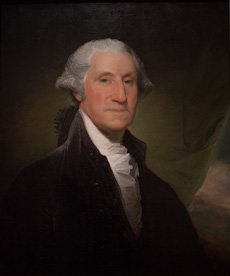
George Washington, painting by Gilbert Stuart
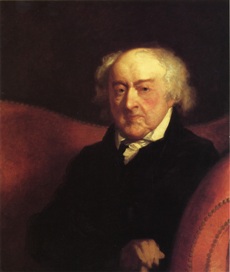
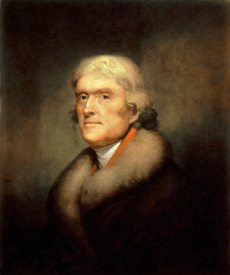
Thomas Jefferson, by Rembrandt Peale
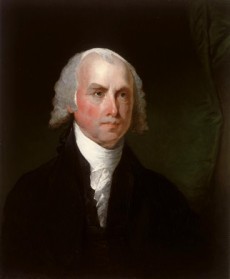
James Madison, by Gilbert Stuart
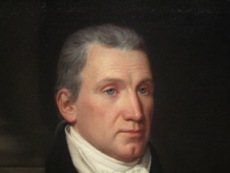
James Monroe